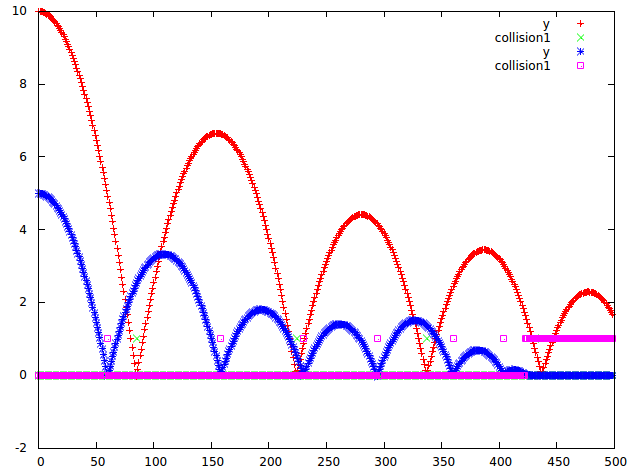Minimal runnable example
Two spheres falling on different points of a plane at different heights.
Since they start at different heights, they will hit the ground at different times.
We detect the ground hit, and print out which sphere touched the ground when.
Gnuplot visualization of stdout:

See how:
- when one sphere hits the ground, the pink square collision indicator goes to
1
- when the other sphere hits the ground, the green
X goes to 1
Code:
#include <cstdio>
#include <cstdlib>
#include <map>
#include <vector>
#include <btBulletDynamicsCommon.h>
#define PRINTF_FLOAT "%7.3f"
constexpr float gravity = -10.0f;
constexpr float timeStep = 1.0f / 60.0f;
constexpr float groundRestitution = 0.9f;
constexpr float objectRestitution = 0.9f;
constexpr int maxNPoints = 500;
constexpr float initialXs[] = { 0.0f, 5.0f };
constexpr float initialYs[] = { 10.0f, 5.0f };
constexpr size_t nObjects = sizeof(initialYs) / sizeof(*initialYs);
std::map<const btCollisionObject*,std::vector<btManifoldPoint*>> objectsCollisions;
void myTickCallback(btDynamicsWorld *dynamicsWorld, btScalar timeStep) {
objectsCollisions.clear();
int numManifolds = dynamicsWorld->getDispatcher()->getNumManifolds();
for (int i = 0; i < numManifolds; i++) {
btPersistentManifold *contactManifold = dynamicsWorld->getDispatcher()->getManifoldByIndexInternal(i);
auto *objA = contactManifold->getBody0();
auto *objB = contactManifold->getBody1();
auto& collisionsA = objectsCollisions[objA];
auto& collisionsB = objectsCollisions[objB];
int numContacts = contactManifold->getNumContacts();
for (int j = 0; j < numContacts; j++) {
btManifoldPoint& pt = contactManifold->getContactPoint(j);
collisionsA.push_back(&pt);
collisionsB.push_back(&pt);
}
}
}
int main() {
int i, j;
btDefaultCollisionConfiguration *collisionConfiguration
= new btDefaultCollisionConfiguration();
btCollisionDispatcher *dispatcher = new btCollisionDispatcher(collisionConfiguration);
btBroadphaseInterface *overlappingPairCache = new btDbvtBroadphase();
btSequentialImpulseConstraintSolver* solver = new btSequentialImpulseConstraintSolver;
btDiscreteDynamicsWorld *dynamicsWorld = new btDiscreteDynamicsWorld(
dispatcher, overlappingPairCache, solver, collisionConfiguration);
dynamicsWorld->setGravity(btVector3(0, gravity, 0));
dynamicsWorld->setInternalTickCallback(myTickCallback);
btAlignedObjectArray<btCollisionShape*> collisionShapes;
// Ground.
{
btTransform groundTransform;
groundTransform.setIdentity();
groundTransform.setOrigin(btVector3(0, 0, 0));
btCollisionShape* groundShape;
groundShape = new btStaticPlaneShape(btVector3(0, 1, 0), -1);
collisionShapes.push_back(groundShape);
btDefaultMotionState* myMotionState = new btDefaultMotionState(groundTransform);
btRigidBody::btRigidBodyConstructionInfo rbInfo(0, myMotionState, groundShape, btVector3(0, 0, 0));
btRigidBody* body = new btRigidBody(rbInfo);
body->setRestitution(groundRestitution);
dynamicsWorld->addRigidBody(body);
}
// Objects.
for (size_t i = 0; i < nObjects; ++i) {
btCollisionShape *colShape;
colShape = new btSphereShape(btScalar(1.0));
collisionShapes.push_back(colShape);
btTransform startTransform;
startTransform.setIdentity();
startTransform.setOrigin(btVector3(initialXs[i], initialYs[i], 0));
btVector3 localInertia(0, 0, 0);
btScalar mass(1.0f);
colShape->calculateLocalInertia(mass, localInertia);
btDefaultMotionState *myMotionState = new btDefaultMotionState(startTransform);
btRigidBody *body = new btRigidBody(btRigidBody::btRigidBodyConstructionInfo(
mass, myMotionState, colShape, localInertia));
body->setRestitution(objectRestitution);
dynamicsWorld->addRigidBody(body);
}
// Main loop.
std::printf("step body x y z collision2 collision1\n");
for (i = 0; i < maxNPoints; ++i) {
dynamicsWorld->stepSimulation(timeStep);
for (j = dynamicsWorld->getNumCollisionObjects() - 1; j >= 0; --j) {
btCollisionObject *obj = dynamicsWorld->getCollisionObjectArray()[j];
btRigidBody *body = btRigidBody::upcast(obj);
btTransform trans;
if (body && body->getMotionState()) {
body->getMotionState()->getWorldTransform(trans);
} else {
trans = obj->getWorldTransform();
}
btVector3 origin = trans.getOrigin();
std::printf("%d %d " PRINTF_FLOAT " " PRINTF_FLOAT " " PRINTF_FLOAT " ",
i, j, origin.getX(), origin.getY(), origin.getZ());
auto& manifoldPoints = objectsCollisions[body];
if (manifoldPoints.empty()) {
std::printf("0");
} else {
std::printf("1");
}
puts("");
}
}
// Cleanup.
for (i = dynamicsWorld->getNumCollisionObjects() - 1; i >= 0; --i) {
btCollisionObject* obj = dynamicsWorld->getCollisionObjectArray()[i];
btRigidBody* body = btRigidBody::upcast(obj);
if (body && body->getMotionState()) {
delete body->getMotionState();
}
dynamicsWorld->removeCollisionObject(obj);
delete obj;
}
for (i = 0; i < collisionShapes.size(); ++i) {
delete collisionShapes[i];
}
delete dynamicsWorld;
delete solver;
delete overlappingPairCache;
delete dispatcher;
delete collisionConfiguration;
collisionShapes.clear();
}
Tested on Bullet 2.83, Ubuntu 15.10.
GitHub upstream: https://github.com/cirosantilli/cpp-cheat/blob/d7b70153b8f86b5864c22fbc6f7005049a93491f/bullet/which_collision.cpp

